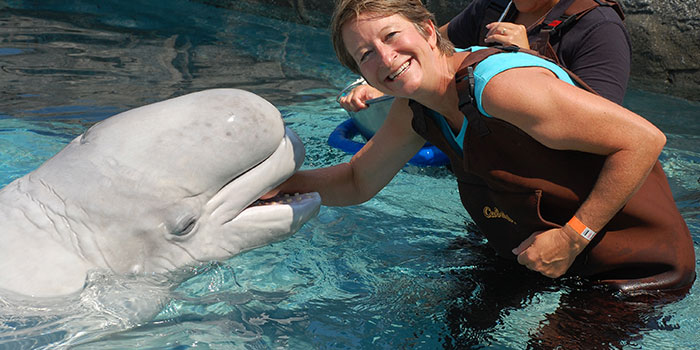Liz Baird: Video Transcript
Hear Liz talk about her job. Download (mp4, 42 MB).
Introduction
My name is Liz Baird and I’m Director of Education at the North Carolina Museum of Natural Sciences which is in Raleigh, North Carolina.
About Liz’s Job
The work that I do is quite diverse. And my work at sea is only a small portion of my job. When I’m out here, I feel as if I’m a translator for the scientists. I’m trying to take their passion and excitement for the ocean and the work they’re doing and help the general public understand it. Sometimes scientists fall into a habit of using acronyms and scientific names and maybe explaining things in such a way that it’s confusing. And what I want to do is share the discovery, share the explorations, share the enthusiasm that is almost childlike wonder at times when you see something come up for the first time or you get to spot it on the ROV.
Job Requirements
As Director of Education, I think that you need a variety of skills in order to be successful. I have a master’s degree in science education, so that really helps, but I think it’s really important to have experience. This job requires you to reach a lot of different audiences and so in addition to having the degree, it’s important to have had experience teaching in a traditional setting like a school as well as a non-traditional setting like a museum. And that way, you can reach anybody who walks in the door.
A Not-so-typical Week
In a typical work week, I’m at the museum from about 8:30 to 5:30 every day, about 40 hours a week. But my job is rarely typical. When I’m in the field leading teachers on a teacher trek or students on an overnight canoe camping trip, it’s a really long day. Probably 16 hours easy. And out here at sea, it’s another 16-hour day. I want to maximize my time. I feel like I can sleep when I get home. So, after breakfast you start working and you don’t quit until the last sample is processed, which can be well into the wee hours of the next day.

Liz works to help people understand the world around them, which in turn can help them learn to love, and therefore protect, our natural world. Click on the image to learn more about rewards of Liz's profession.
Working at the North Carolina Museum of Natural Sciences
I know that people don’t value and protect things that they don’t understand and things that they don’t love. And I feel that my work at the museum helps benefit the public because I give them a chance to see, understand, and fall in love with the natural world in a way that they might not have ever had a chance to do. And if they love a space, they’ve seen the deepwater corals like we’re seeing out here, then they’re more likely protect it, make wise choices about how to use it in a sustainable fashion. To really start seeing this big planet as something that we all have a responsibility for. And if one little person gets excited about what we’re doing and feels like we need to protect it, then I think this is good for the public and good for all of us.
Rewards of the Job
I find my work at the museum really personally rewarding. My hope is to give people fresh eyes for seeing the natural world and seeing the world around them. And sometimes it’s helping them see something in their own backyard, like catching a toad and figuring out how to tell if it’s a male or a female. And sometimes it’s taking them to new places, like traveling with teachers to Pocosin Lakes National Wildlife Refuge. And sometimes it’s using things like this research mission to show them things that they may never get a chance to see. And some people don’t want to spend time on boats. And so by taking footage, by taking images, by telling stories from being at sea, I’m hoping that they a new eye for seeing what’s going on out here. And when I see folks whose expressions change as they feel the smooth skin of a snake for the first time or watch with wonder when they see images from a dive, I feel like I’ve done what I want to do.
Magical Moments
The most fascinating thing I’ve ever seen or done is really hard to identify. I’ve been privileged to see lots of really amazing things and go lots of amazing places. One thing I love is bioluminescence. And I’ve loved that since I was a kid. We used to walk down the beach and see our glowing footprints behind us in the sand in North Carolina and marvel at the way that some of the things that washed up on the beach would glow. And seeing it from the submersible is just breathtaking.
But my first year at sea on a research vessel, I was on the night watch and that was a long, dark night. And sometimes we would take a quick break and go up to the bow and you could always see the bioluminescence spraying off the bow. It would be just igniting the bow. And one night I was up there and looked and realized that I could see the dark outlines of dolphins riding the bow wave. So their shapes were silhouetted in the bow as a black shadow and you could identify them completely. And then they would dart off into the ocean like shooting stars in the sea. It was…magical.
Return to profile